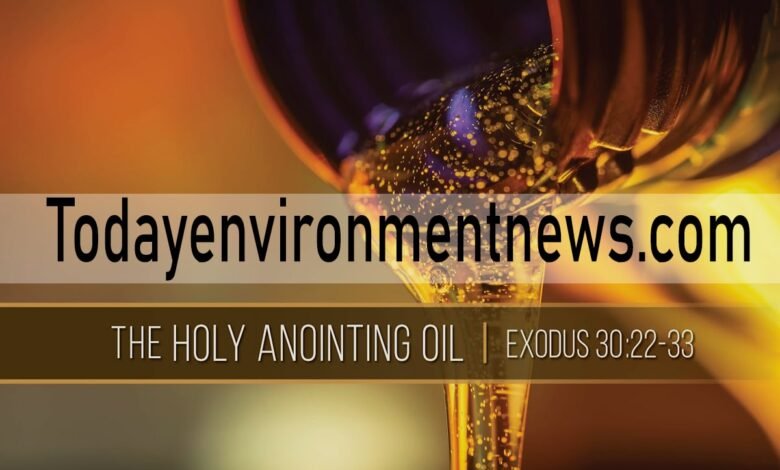Sacred Traditions: Understanding Holy Anointing Oil

Holy anointing oil has been a cornerstone of spiritual practice for thousands of years, bridging ancient traditions with modern faith. This sacred blend carries profound meaning across multiple religious traditions, serving as a tangible connection between the physical and spiritual realms.
Whether you’re exploring your faith journey, seeking to understand biblical traditions, or looking to incorporate anointing oil into your spiritual practice, understanding its history, composition, and significance can deepen your connection to this timeless ritual. This guide will walk you through everything you need to know about holy anointing oil, from its ancient origins to its contemporary applications.
From the sacred recipes described in Exodus to the modern bottles found in churches and homes worldwide, anointing oil continues to play a vital role in ceremonies, prayers, and personal devotion. Let’s explore how this ancient practice remains relevant and meaningful for believers across the globe.
What is Holy Anointing Oil: History and Significance
Holy anointing oil represents one of humanity’s oldest spiritual practices, with archaeological evidence suggesting its use in religious ceremonies dating back over 4,000 years. The practice transcends cultural boundaries, appearing in ancient Egyptian, Hebrew, Greek, and Roman traditions, each culture attributing sacred properties to specially prepared oils.
The term “anoint” comes from the Latin word “inungere,” meaning “to smear” or “rub with oil.” This simple act carries profound spiritual weight, symbolizing consecration, blessing, and divine protection. Ancient civilizations believed that anointing with sacred oils created a barrier between the physical and spiritual worlds, offering protection from evil and inviting divine presence.
Historically, anointing oil served multiple purposes beyond religious ceremony. Kings and priests were anointed to mark their divine appointment to leadership roles. The oil signified God’s blessing upon their service and established their authority as divinely ordained. This practice established the concept of “the anointed one,” which holds central importance in many religious traditions.
The significance of anointing oil extends beyond ceremonial use. Many believers view it as a tangible representation of God’s presence and blessing. The oil serves as a physical reminder of spiritual truths, helping practitioners focus their prayers and intentions during worship or personal devotion.
Biblical References: Scriptural Importance of Anointing Oil
The Bible contains numerous references to anointing oil, establishing its importance in Judeo-Christian tradition. The most detailed description appears in Exodus 30:22-25, where God provides Moses with specific instructions for creating holy anointing oil. This passage outlines exact measurements and ingredients, emphasizing the sacred nature of the preparation process.
Exodus describes the oil as “holy anointing oil” that should be used to consecrate the tabernacle, the ark of testimony, and all sacred vessels. The scripture emphasizes that this oil should be “holy throughout your generations,” establishing its enduring significance for future believers.
The practice of anointing appears throughout both the Old and New Testaments. Samuel anointed David as king of Israel, marking the beginning of his divinely appointed reign. Jesus himself was anointed with expensive oil, an act that he declared was preparation for his burial, adding layers of meaning to the practice.
In the New Testament, James 5:14 instructs believers to anoint the sick with oil while praying for healing. This passage establishes anointing oil as a tool for physical and spiritual restoration, a practice that continues in many Christian denominations today.
The symbolic meaning of anointing oil in scripture represents God’s blessing, protection, and empowerment. When individuals were anointed, they received divine authority and blessing for their appointed tasks, whether as kings, priests, or prophets.
Ingredients: Exploring the Traditional Components
The biblical recipe for holy anointing oil, found in Exodus 30, specifies four primary ingredients: myrrh, sweet cinnamon, sweet calamus, and cassia, all blended with olive oil. Each component carries specific spiritual significance and practical properties that contribute to the oil’s sacred nature.
Myrrh, mentioned first in the biblical recipe, was among the most precious substances in the ancient world. This resin, obtained from the Commiphora tree, symbolizes suffering and sacrifice. Its inclusion in anointing oil represents the cost of spiritual dedication and the willingness to endure hardship for faith.
Sweet cinnamon adds warmth and fragrance to the blend while symbolizing prayer and worship. Ancient cultures associated cinnamon with divine presence, believing its sweet aroma attracted heavenly attention and favor. The spice’s rarity and value also emphasized the precious nature of the anointing oil.
Sweet calamus, derived from a marsh plant, represents humility and spiritual cleansing. This ingredient grows in wet, lowly places, symbolizing how God lifts up the humble and cleanses them for service. Some scholars debate the exact identity of this plant, but its symbolic meaning remains consistent across interpretations.
Cassia, similar to cinnamon but milder in flavor, rounds out the aromatic blend. This spice symbolizes praise and worship, adding depth to the oil’s fragrance profile. Together with the other ingredients, cassia creates a complex, memorable scent that enhances the spiritual experience of anointing.
Olive oil serves as the base for these precious ingredients, chosen for both practical and symbolic reasons. Olive oil burns cleanly in lamps, representing the light of God’s presence. Its production requires patience and careful processing, symbolizing the spiritual refinement believers undergo in their faith journey.
Modern Uses: Anointing Oil in Contemporary Spiritual Practices
Contemporary spiritual practices have adapted ancient anointing traditions to meet modern needs while preserving their sacred significance. Churches across various denominations incorporate anointing oil into services for healing, blessing, and consecration ceremonies.
Many Christian churches use anointing oil during prayer for the sick, following the biblical instruction in James 5:14. Pastors and elders anoint individuals seeking physical, emotional, or spiritual healing, believing the oil serves as a conduit for God’s healing power. This practice provides comfort to those suffering and demonstrates the church community’s care and support.
Anointing oil plays a significant role in ordination ceremonies for ministers, deacons, and other church leaders. The act of anointing symbolizes God’s calling upon their lives and empowers them for service. This ancient practice connects modern leaders with the biblical tradition of anointing priests and kings.
Personal devotional use of anointing oil has grown increasingly popular among individual believers. Many people keep small vials of anointing oil for private prayer, meditation, and spiritual warfare. They may anoint their homes, family members, or personal belongings as acts of consecration and protection.
Some believers use anointing oil during significant life events such as baptisms, confirmations, marriages, and dedications. These applications extend the traditional uses while maintaining the oil’s sacred character and spiritual significance.
Interfaith communities have also embraced anointing practices, adapting them to their specific theological frameworks while respecting the historical significance of the tradition.
How to Prepare: A DIY Guide to Making Anointing Oil
Creating your own holy anointing oil allows for personal connection with this ancient practice while ensuring the ingredients meet your spiritual standards. The process requires careful attention to biblical specifications and reverent preparation.
Begin by gathering high-quality ingredients that match the biblical recipe as closely as possible. Pure myrrh essential oil or resin, cinnamon bark essential oil, calamus essential oil, and cassia essential oil form the aromatic components. Extra virgin olive oil serves as the carrier oil, chosen for its biblical significance and stability.
Measure ingredients according to the proportions given in Exodus 30, adjusting quantities based on how much oil you wish to prepare. The biblical measurements translate roughly to equal parts of the four aromatic ingredients, blended into approximately one gallon of olive oil for the original recipe.
Prepare your workspace with clean utensils and containers, treating the process as a sacred activity. Some people prefer to pray or meditate during preparation, asking for God’s blessing upon the oil and its intended uses.
Gently warm the olive oil without bringing it to a boil, as excessive heat can damage the essential oils’ properties. Slowly add the aromatic ingredients, stirring carefully to ensure even distribution. The warming process helps the oils blend more thoroughly.
Allow the mixture to cool completely before transferring it to clean glass containers. Dark glass bottles protect the oil from light degradation and help preserve its potency over time. Label your containers with the preparation date and contents.
Store the finished oil in a cool, dark place to maintain its quality and spiritual significance. Many people dedicate a special area for storing their anointing oil, treating it with the reverence due to sacred items.
Benefits: Spiritual and Emotional Advantages of Using Anointing Oil
Using holy anointing oil provides numerous spiritual and emotional benefits that enhance faith practice and personal well-being. These advantages stem from both the oil’s symbolic significance and the intentional spiritual focus it promotes.
The primary spiritual benefit lies in creating a tangible connection to biblical tradition and divine presence. When believers use anointing oil, they participate in the same practice that consecrated kings, priests, and prophets throughout biblical history. This connection provides a sense of continuity with ancient faith and divine purpose.
Anointing oil enhances prayer and meditation practices by engaging multiple senses. The fragrant aroma helps focus attention and creates a sacred atmosphere conducive to spiritual reflection. Many people find that the physical act of anointing helps them concentrate during prayer and feel more connected to their spiritual intentions.
The practice offers emotional comfort during times of stress, illness, or uncertainty. The act of anointing represents God’s care and protection, providing reassurance and peace to those facing challenges. Many believers report feeling calmer and more hopeful after anointing prayers.
Using anointing oil can strengthen faith and spiritual confidence. The physical reminder of God’s presence and blessing helps believers feel empowered to face difficulties and pursue their spiritual calling with greater determination.
The communal aspect of anointing, when practiced in group settings, builds spiritual fellowship and mutual support. When church members participate in anointing services together, they experience shared faith and collective prayer that strengthens their spiritual bonds.
Regular use of anointing oil in personal devotion creates positive spiritual habits and disciplines. The practice encourages consistent prayer time and spiritual reflection, contributing to overall spiritual growth and maturity.
The Enduring Relevance of Holy Anointing Oil
Holy anointing oil maintains its relevance across millennia because it addresses fundamental human needs for connection, meaning, and spiritual expression. Its enduring appeal demonstrates how ancient practices can provide contemporary spiritual nourishment when approached with genuine faith and understanding.
The practice bridges the gap between physical and spiritual reality, offering believers a tangible way to express intangible faith. In our increasingly digital world, the physical nature of anointing provides grounding and authenticity that many people crave in their spiritual lives.
Modern psychology recognizes the power of ritual and symbolism in human experience. Anointing oil serves both functions, creating meaningful ritual while symbolizing divine presence and blessing. This combination addresses psychological needs for ceremony and symbolic expression that transcend cultural boundaries.
The flexibility of anointing practices allows adaptation to various spiritual contexts while maintaining core meaning. Different denominations and individuals can modify the practice to fit their theological understanding while preserving the essential elements of consecration and blessing.
As people seek authentic spiritual experiences, ancient practices like anointing offer tested methods for encountering the divine. The thousands of years of continuous use provide testimony to the practice’s effectiveness in facilitating spiritual connection and growth.
Frequently Asked Questions
Can anyone make holy anointing oil?
Yes, individuals can prepare anointing oil for personal use by following biblical guidelines and approaching the process with reverence. However, some religious traditions require specific ordination or training for preparing oil used in official church ceremonies.
How long does homemade anointing oil last?
Properly stored anointing oil can maintain its quality for 1-2 years. Keep it in dark glass containers away from heat and light to preserve the essential oils’ potency and prevent rancidity in the olive oil base.
Is there a difference between anointing oil and regular essential oil blends?
Yes, anointing oil is specifically prepared for spiritual purposes using biblical ingredients and often blessed or consecrated for sacred use. Regular essential oil blends may contain different ingredients and lack the spiritual intention behind anointing oil.
Can anointing oil be used for healing?
Many believers use anointing oil in prayers for healing, following the biblical instruction in James 5:14. While the oil itself doesn’t possess magical healing properties, it serves as a focus for faith and prayer, which many believe facilitates divine healing.
What should I do if I spill anointing oil?
Clean up spilled anointing oil respectfully, recognizing its sacred nature. Some people prefer to clean it with reverent attention rather than treating it as a common household accident, though there are no specific biblical requirements for handling spills.
Can I use substitutes for the biblical ingredients?
While traditional ingredients are preferred, some people use similar aromatic oils when exact biblical ingredients are unavailable or prohibitively expensive. The key is maintaining the spiritual intention and reverence behind the preparation.
Embracing Sacred Tradition in Modern Faith
Holy anointing oil represents more than just a fragrant blend of precious ingredients. It embodies thousands of years of faith tradition, providing believers with a tangible connection to biblical history and divine presence. From its detailed description in Exodus to its continued use in contemporary spiritual practices, anointing oil demonstrates the enduring power of sacred tradition.
Whether you choose to purchase prepared anointing oil or create your own blend, the key lies in approaching this practice with genuine faith and reverence. The physical act of anointing serves as a bridge between ancient wisdom and modern spiritual needs, offering comfort, blessing, and connection to the divine.
As you explore the use of holy anointing oil in your spiritual journey, remember that its true power lies not in the ingredients themselves, but in the faith and intention behind their use. This sacred tradition continues to provide meaningful spiritual expression for believers seeking deeper connection with their faith and with God.



